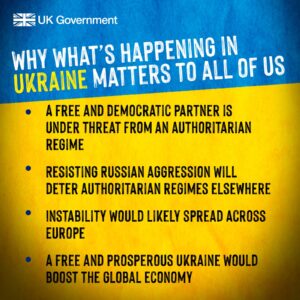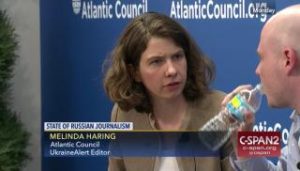Most, if not all, policymakers in the democratic West have learned that not sufficiently countering Russian revanchism taught Vladimir Putin that he could get away with more aggression, say the authors of a new Atlantic Council report.
Fourteen years since 2008, a period marked by Russia’s military build-up and a global authoritarian resurgence, democrats around the world recognize the stakes of today’s crisis are not about Ukraine alone, but about the future of freedom, they observe in a Global Strategy 2022 analysis, Thwarting Kremlin aggression today for constructive relations tomorrow.
Today’s Ukraine crisis is entirely fabricated, notes Damon Wilson, President and CEO of the National Endowment for Democracy (NED). Putin recognizes that if freedom and democracy succeed in Ukraine—or Georgia or Belarus—that if they follow the wildly successful path of the Baltic states, it is only a matter of time until the Russian people demand more for themselves. But it’s neither Ukraine nor NATO that threatens Russia, he writes:
 Rather, Putin fears people, including his own people. So, as he thrusts the world into his latest crisis, we must avoid contorted efforts to meet his demands, echoing the actions of democracies in the 1930s which led to disaster. Rather, democracies today must meet this moment with democratic unity and strength—with solidarity with Ukraine as a nation, and solidarity with the people of Russia who deserve so much better.
Rather, Putin fears people, including his own people. So, as he thrusts the world into his latest crisis, we must avoid contorted efforts to meet his demands, echoing the actions of democracies in the 1930s which led to disaster. Rather, democracies today must meet this moment with democratic unity and strength—with solidarity with Ukraine as a nation, and solidarity with the people of Russia who deserve so much better.
The report’s recommendations include:
- Encourage the emergence of a political system in Russia that rejects a revisionist foreign policy, moves toward a more open society, and that would be a good partner for cooperation with the United States and the West.
- Maintain support for the “non-systemic” Russian opposition and dissidents consistent with US principles. This includes statements of public support when basic human rights and political norms are violated…..
- Building on the first Summit for Democracy, Biden should frame the problem of Russian (and Chinese) aggressive policies as part of an authoritarian challenge to the democratic world. At a minimum, this forum should offer a diplomatic response to Kremlin revisionism and should serve as the start of a continuing process that can underpin the comprehensive strategy set out above.
- The administration should also develop the D-10, the world’s ten leading democracies, as another vehicle to meet the authoritarian challenge and a venue to address money laundering. RTWT

C-Span
The report is launched today: Maria Logan of the Future of Russia Foundation provides opening remarks. Damon Wilson, President and CEO of the National Endowment for Democracy (NED), frames the strategic discussion. Ambassador John E. Herbst, senior director of the Atlantic Council’s Eurasia Center and the paper’s lead author outlines the strategy’s key elements. Melinda Haring, deputy director of the Atlantic Council’s Eurasia Center and a former NED Penn Kemble fellow, moderates a discussion with Herbst, Dr. Evelyn Farkas, former US deputy assistant secretary of defense for Russia, Ukraine, and Eurasia, and NED board member Stephen E. Biegun, former US deputy secretary of state. Register here.
I remember when the cartoon in 2008 was about Putin’s invasion of Georgia being an obvious warning to Ukraine. But it went unpunished and here we are again. pic.twitter.com/wZSdIlaG99
— Garry Kasparov (@Kasparov63) February 8, 2022







